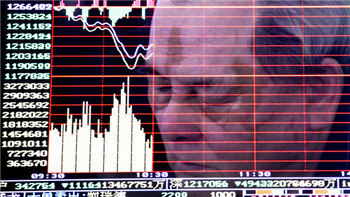
China is to extend a ban on stock sales by large shareholders until permanent rules to restrict such sales take effect, as authorities seek to calm market fears over the lock-up that was due to expire tomorrow.
中國(guó)將延長(zhǎng)一項(xiàng)禁止大股東出售股票的禁令——直至限制此類售股行為的永久規(guī)則生效。當(dāng)局正試圖平息市場(chǎng)對(duì)鎖定期原定明天到期的擔(dān)憂。
China’s blue-chip stock index, the CSI 300, tumbled 7 per cent on Monday, raising the prospect of a return to the panic selling of last summer when the main index was down 45 per cent at one stage.
周一,中國(guó)藍(lán)籌股指數(shù)滬深300(CSI 300)暴跌7%,引發(fā)了去年夏天的恐慌性拋售再次出現(xiàn)的可能性。在去年夏天的拋售中,中國(guó)主要股指一度跌去45%。
Analysts blamed Monday’s fall on fears over the impending end of the ban, which was imposed in early July.
分析師將周一的下跌歸因于人們擔(dān)心該禁令即將失效。這一禁令是2015年7月初出臺(tái)的。
Markets stabilised on Tuesday, but only after the “national team” of state financial institutions reportedly stepped in to buy shares. China’s main indices each closed more than 2 per cent higher yesterday.
周二股市恢復(fù)了穩(wěn)定,不過據(jù)稱這也是在由官方金融機(jī)構(gòu)組成的“國(guó)家隊(duì)”進(jìn)場(chǎng)買入股票之后才發(fā)生的。昨天,中國(guó)各主要股指均收漲逾2%。
The extension of the ban is likely to reassure markets in the short term, but will raise fresh doubts about the government’s willingness to liberalise its capital markets and reduce moral hazard.
該禁令的延期可能會(huì)在短期內(nèi)對(duì)市場(chǎng)起到寬慰作用。然而,它將令人質(zhì)疑中國(guó)政府放開資本市場(chǎng)、降低道德風(fēng)險(xiǎn)的意愿。
In the first half of last year, large shareholders on average sold a net Rmb76bn ($11.7bn) a month, according to analysts at Citigroup. That switched to net monthly buying of Rmb42bn following the stock sales ban.
根據(jù)花旗集團(tuán)(Citigroup)分析師的說法,去年上半年大股東平均每月凈賣出760億元人民幣(合117億美元)。而在減持禁令啟動(dòng)之后,該數(shù)據(jù)變?yōu)槊吭聝糍I入420億元人民幣。
Expiry of the current restriction would result in about Rmb100bn of selling pressure per month, Citi estimates.
花旗估計(jì),當(dāng)前禁令的失效將導(dǎo)致每月大約1000億元人民幣的售股壓力。
The official Shanghai Securities News reported yesterday that China’s securities regulator was drafting new permanent rules to restrict sales by large stockholders.
昨天,據(jù)官方《上海證券報(bào)》(Shanghai Securities News)報(bào)道,中國(guó)證券監(jiān)管機(jī)構(gòu)正在起草新的限制大股東拋售股票的永久規(guī)則。
The regulator will extend the current ban, which bars sales by investors who hold at least 5 per cent of a single company’s tradeable shares, until the new rules are complete, the paper reported, citing unnamed sources.
該報(bào)援引未公開的消息來源報(bào)道稱,監(jiān)管機(jī)構(gòu)將把現(xiàn)有禁令(該禁令禁止持有一家上市公司至少5%流通股的股東出售股票)延長(zhǎng)至新規(guī)定正式發(fā)布實(shí)施。
The paper emphasised that regulators would ensure there was no gap between the expiry of the temporary ban and the imposition of new permanent rules, an assurance designed to allay investor concerns that big shareholders could exploit a chance to dump shares en masse.
該報(bào)強(qiáng)調(diào),監(jiān)管機(jī)構(gòu)會(huì)確保該臨時(shí)性禁令失效與新的永久規(guī)定實(shí)施之間不存在空檔期,這一保證旨在減輕投資者對(duì)大股東可能借機(jī)大舉拋售股票的擔(dān)憂。
“Large shareholders still have many methods they can use to reduce their holdings. Hedging is one example. This move is more about calming market sentiment. If they want to sell, they can still do it,” said Guo Yanhong, analyst at Founder Securities in Beijing.
北京方正證券(Founder Securities)分析師郭艷紅表示:“大股東仍有許多可以動(dòng)用的手段降低持股比例。對(duì)沖操作就是一個(gè)例子。這一舉措更主要的是為了安撫市場(chǎng)情緒。如果他們想要售股,他們?nèi)匀荒軌蜃龅健!?/p>
The report in official media follows a statement by the China Securities Regulatory Commission on Tuesday in which the agency said it was “researching” new permanent rules to restrict share sales by large shareholders as well as by directors and managers.
就在官方媒體上述報(bào)道之前,中國(guó)證監(jiān)會(huì)(CSRC)周二發(fā)布聲明稱,正在“研究”限制大股東、公司董事和經(jīng)理人減持股票的新的永久性規(guī)定。
The CSRC said it was considering a requirement that large shareholders disclose share sale plans in advance.
證監(jiān)會(huì)表示,正在考慮要求大股東提前披露股份減持計(jì)劃。











